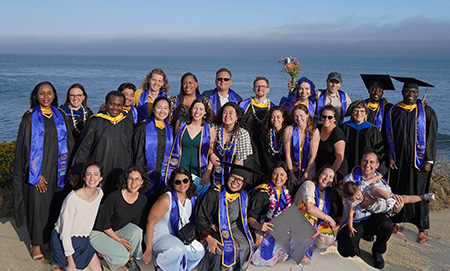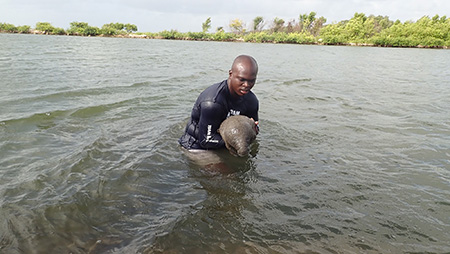Campus News
Coastal Science & Policy Program celebrates five years at UC Santa Cruz
Coastal Science and Policy Program Director Anne Kapuscinski reflects on the last five years and looks ahead to the future.



When a forward-thinking group of UC Santa Cruz faculty began envisioning a new opportunity to train rising leaders in coastal conservation, innovation, and climate solutions, they knew exactly who they wanted at the program’s helm.
Anne Kapuscinski is an interdisciplinary scholar committed to finding scientifically and socially robust solutions to issues affecting coastal communities. She was the natural fit to lead the new Coastal Science and Policy (CSP) graduate program which offers a two-year master of science degree and a PhD designated emphasis.
Kapuscinski, whose research has included examining the impacts of dams, fish hatcheries, aquaculture, and genetic engineering on fish conservation, is a leader in sustainability science and shifting aquaculture—the world’s fastest-growing food sector—towards enhancing food diversity and climate resiliency in coastal regions. She has served as a scientific advisor at the national and global level and currently chairs the Board of Directors of the Union of Concerned Scientists.
Since joining UCSC in 2018, Kapuscinski has led six cohorts through the inaugural years of CSP. The program prepares rising leaders to identify, innovate, and implement scalable and socially just solutions to climate, biodiversity, and other sustainability challenges in coastal zones around the world.
The start of something new
Kapuscinski was more than keen to join the new endeavor at UCSC, the first of its kind in the UC system. She had led two programs with interdisciplinary goals like CSP at previous institutions but both lacked the central focus that CSP has on using interdisciplinary approaches to design and implement practical solutions. She was excited to see what kind of an impact that the practical focus, close collaboration with practitioners, and global scope of CSP could make.
“I was inspired by the opportunity to lead, teach, and mentor in a graduate program with a deep-change structure to it, and that has this more ‘out-of-the-box’ way of thinking about advancing solutions,” she says. For example, under her leadership, CSP launched the nation’s first Hacking for Oceans course, where graduate and undergraduate students use Lean Startup methods to solve actual problems facing ocean focused organizations.
The CSP program uses a cohort structure to provide in-depth mentorship and a collaborative space for its students, most of whom have worked professionally before starting graduate studies. The students in each cohort work together through coursework over the first year and then conduct individual capstone projects with a partner organization either locally, elsewhere in the US, or abroad for the second year. This can include work with nationally recognized or globally recognized organizations as well as organizations that the students had worked with before their time at UCSC.
The cohort structure has led to students deeply bonding over both their singular and collective projects to advance solutions to complex coastal challenges. For example, they have addressed issues such as conserving marine biodiversity, shifting fishing and aquaculture to sustainability, and enhancing coastal climate resilience while improving equity.
One of the added benefits of the cohort structure is the transformative learning and new connections that emerge from a supportive community with high diversity, reflected among the program’s students, their past professional standings, and their projects. Kapuscinski notes that this aspect—an opportunity for students from the U.S. to work with and learn from students from Belize, Indonesia, and Malawi, for instance—has made the program all the more competitive with other renowned universities.
“As the director, but also as someone learning along with our students and our faculty, I have found that to be one of the most rewarding aspects of the program,” Kapuscinski said. “I can genuinely say I have learned so much more myself, from being in a community and leading a community of students with such great diversity of lived and professional experiences at the table.”
Building community along the coast
The program has trained 78 students thus far, representing 23 nations including the US. Their successes have proven that CSP serves as a stepping stone to advancing their careers and discovering solutions to environmental issues. Since 2020, CSP also has extended its impact by running the Blue Pioneers Accelerator Program, enhancing innovation skills and collaborative networks of 82 early career, marine conservation working professionals from the Asia Pacific region.
Nearly every student in CSP is hired—either permanently or in long-term contractual work—within six months of graduating or less according to Sarah Eminhizer, CSP director of programs and workplace development. More often than not, the students had worked previously in their chosen field, and the added training from CSP propels them forward into more influential positions.
Ross Davison can attest to that fact. A member of the first cohort which graduated in 2020, Davison had previously worked in archeological preservation and habitat conservation, spending nearly a decade with private, public, and multinational stakeholders to utilize high-tech and innovative tools to protect natural capital. With his roommate, an ecologist, the pair formed a startup that used machine learning (also now called AI) to guide conservation of coastal lands.
Even still, Davison wanted to expand his understanding of conservation work, and applied for the newly launched CSP program, soon returning to his undergraduate alma mater.
“It was very cool for us to get the first pass at the program, and define what we wanted from it,” he said. “Because our cohort developed strong connections, it let us have more of that…there was a nice dialogue those first two years.”
After graduating from CSP, Davison founded Understory, focusing on remote monitoring and evaluating conservation interventions and natural capital from his home base in Pacific Grove. He also won highly competitive National Science Foundation Small Business Innovation Research grants for his startup development.
Jamal Galves is a member of the class of 2023, with a primary focus on manatee conservation. The Belizean native had worked as a program coordinator and research biologist for the Clearwater Marine Aquarium Research Institute, emphasizing manatees as a flagship species to promote coastal conservation.
He was excited by the opportunity to attend UCSC due to its renowned work in the science and coastal conservation community. The added benefit of being part of the CSP program helped to establish a “practicality” to his continued efforts.
“You’re coming from a place that provides recognized knowledge,” Galves said. “I felt that it was more fitting for me to get into a program that would allow me to pick up from where I am, a program that translates into action…you can leave with a world of knowledge, experience, partnership, and networks that allows you to move into many organizations.”
As Galves said, reflecting on the practicality of the program in tandem with mentoring helped him influence policy change: “It encompassed what I needed for my future.”
Galves has returned home to Belize, where he has continued working with manatees and sharing his work via Instagram to his 75,000 followers. Recently, he was recognized as one of the 2023 Explorers Club 50, and has also been featured on an NPR podcast.
Brook Thompson is currently completing her second year in the CSP PhD designated emphasis, while also working toward her Ph.D. degree in environmental studies. Thompson brings her background as a Yurok and Karuk Native of Northern California to her studies, focusing on water rights, salmon restoration and Native American rights through frontline activism. She spoke about these issues on an international panel of indigenous leaders at COP27, the 2022 United Nations climate treaty negotiations.
“For me, what aligns well is that I get to be on the policy side and have this deeper understanding of coastal policies that affect my people,” she said. “Through CSP, I have the privilege to travel and work with a global community, finding similarities between different groups across the world and issues facing our coastal communities.”
In 2023, Thompson was also one of 87 students nationally to be awarded the prestigious Predoctoral Ford Foundation Scholarship.
Towards the future
Kapuscinski and the team have launched a six-year evaluation to strengthen the program for cohorts to come. Among the issues at the forefront of their minds, Kapuscinski notes, “We want to scale the training of early-career leaders while maintaining the program’s best qualities, such as the strongly supportive, diverse community and steady stream of honors awarded to our students.”
Another goal is to turn the global scope and influence of CSP alumni into a collective force to help drive policies and actions that accelerate coastal solutions that work.
“We invite partners to join us in building on our exciting success so far to realize this potential.”